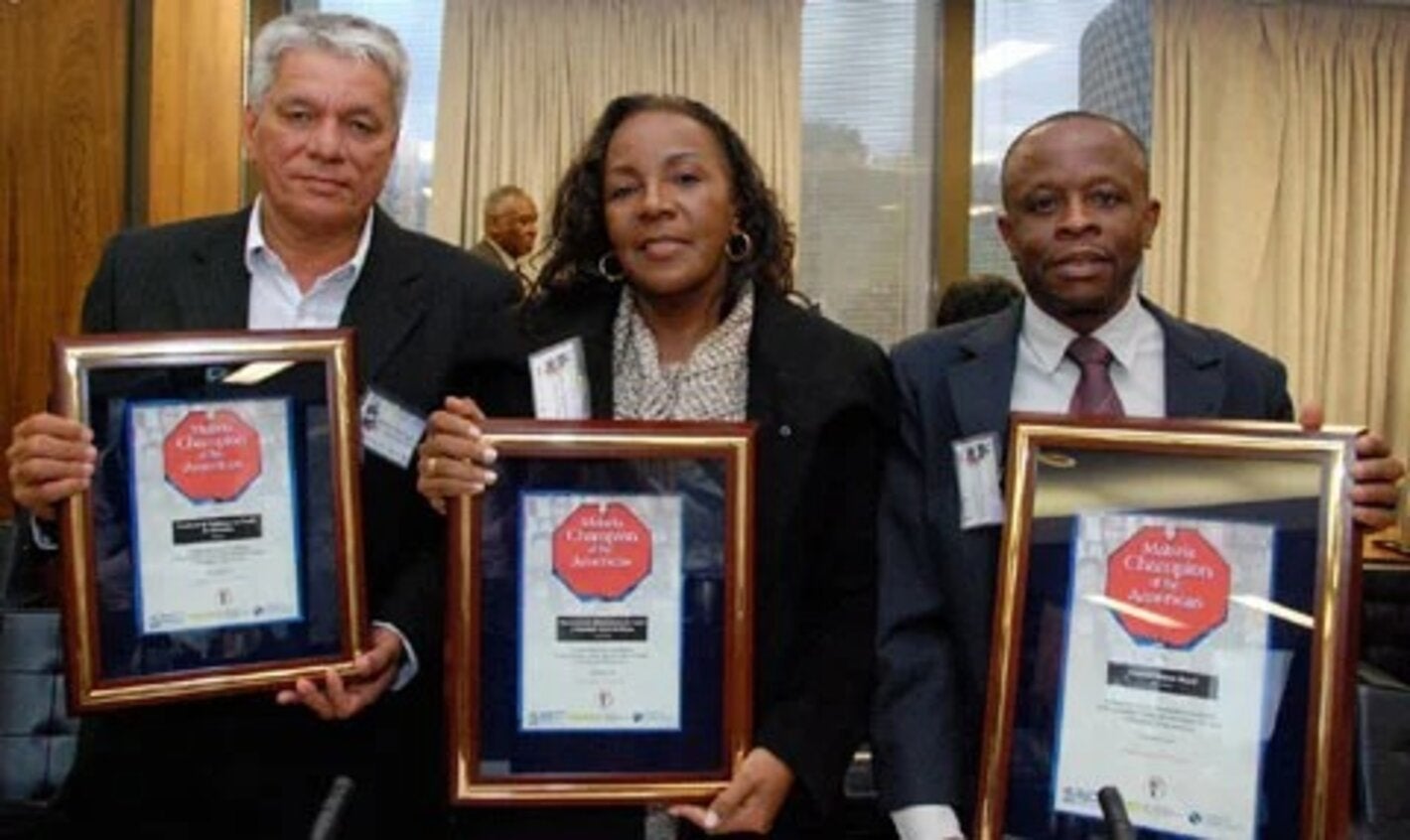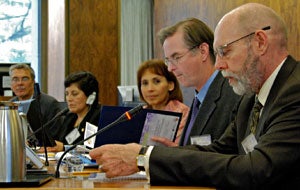
Washington, D.C., 4 November 2010 (PAHO) — Agencies from Suriname, Brazil, and Colombia were honored as "Malaria Champions of the Americas" during a celebration today of the fourth annual Malaria Day in the Americas, at the Pan American Health Organization (PAHO) in Washington, D.C.
PAHO Deputy Director Jon Andrus presented the top "Malaria Champion of the Americas" award to the National Malaria Board of Suriname, which oversees efforts that have virtually eliminated malaria from most of the country's interior.
Using funds from the Global Fund to Fight AIDS, Tuberculosis and Malaria, the National Malaria Board has sponsored training for lay people on the diagnosis and treatment of uncomplicated malaria in gold mining areas, where the disease is now concentrated, and has improved surveillance in areas where the disease has been eliminated. The Board has also guided collaborative efforts between Suriname and French Guiana to reduce high rates of transmission along their common border. In conjunction with the University of Suriname, the Board also established a Malaria Gene Bank to help monitor the development of resistance to anti-malaria drugs.
A second honor was presented to the Foundation for Health Surveillance of the Amazon for its efforts toward integrated prevention and control of malaria in the state of Amazonas. Working through partnerships with all levels of the Brazilian government as well as with nongovernmental organizations and private companies, the Foundation has supported training for more than 7,000 professionals, the creation of 231 laboratories, the distribution of over 75,000 bed nets, spraying of over 350,000 homes, and testing of more than 2.7 million diagnostic exams. These efforts have contributed to a projected 60 percent reduction in cases between 2007 and the end of 2010, and a 60 percent reduction in deaths between 2008 and 2009.
Also honored was the Administrative Department of Health and Social Security of Chocó (DASALUD-Chocó) in Colombia. In collaboration with the Ministry of Social Protection, the National Health Institute, and PAHO, DASALUD-Chocó succeeded in reorienting and strengthening malaria control and prevention efforts, with a focus on areas that have the highest concentration of cases, complications, and deaths. Its efforts have helped reduce the incidence of malaria in Chocó by more than half and have improved surveillance, community education, and patient adherence to malaria treatment regimes.
PAHO Deputy Director Dr. Jon Andrus said all three winners deserved the designation of Malaria Champion of the Americas. "You should all be proud of your work, which has generated such valuable lessons for other countries of our Region."

From the left: Dr. Keith Carter, Lic. Yeni Herrera, Dr. Socorro Gross, Dr. Jon Andrus and PAHEF President Edward L. Kadunc. Photos PAHO/WHO David Spitz.
Participants in the Malaria Day in the Americas event also included Rear Admiral Timothy Ziemer, U.S. Global Malaria Coordinator; Dr. Socorro Gross, Assistant Director of PAHO; Lic. Yeni Herrera, National Coordinator for malaria in the Ministry of Health of Peru; and Dr. Keith Carter, PAHO Senior Advisor on malaria and other communicable diseases.
Dr. Gross noted that malaria cases have declined 56 percent in Latin America since 2000, while deaths have declined by 70 percent.
"Many of our countries seem to be doing things right and addressing the challenges effectively," said Dr. Gross. "It is our goal in today's event to know the stories behind these good results, to document what various partners and stakeholders are doing right and use these important lessons in moving forward."
Yeni Herrera of Peru described comprehensive anti-malaria efforts in her country that have reduced cases by 92 percent since 1997.
Rear Adm. Ziemer pointed to the work of the Amazon Malaria Initiative (AMI), which is supported by USAID, PAHO, the U.S. Centers for Disease Control and Prevention (CDC), Links Media, and other partners, as a model for other regions, particularly Africa. AMI's work has helped improve surveillance of anti-malarial medicine resistance and quality, vector control and entomology, diagnostics, access to diagnosis and treatment, and communication and information dissemination.
"Investing in malaria interventions, treatment and diagnosis is a good public health investment that gives a good return," said Ziemer. "Malaria is an important part of the [U.S.] President's Global Health Initiative."
The Malaria Day in the Americas event was organized by PAHO in coordination with the Pan American Health and Education Foundation (PAHEF), the George Washington University Center for Global Health, and Links Media.



